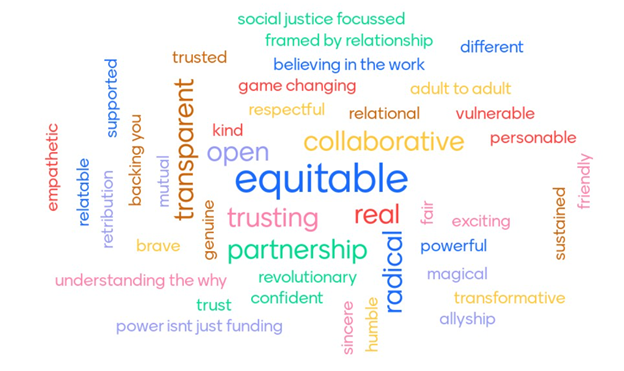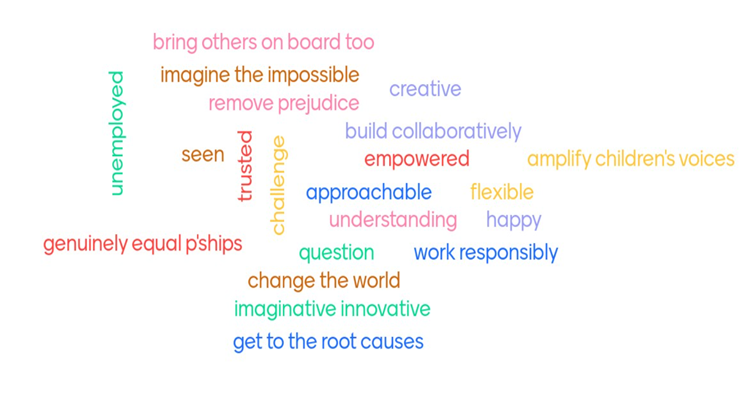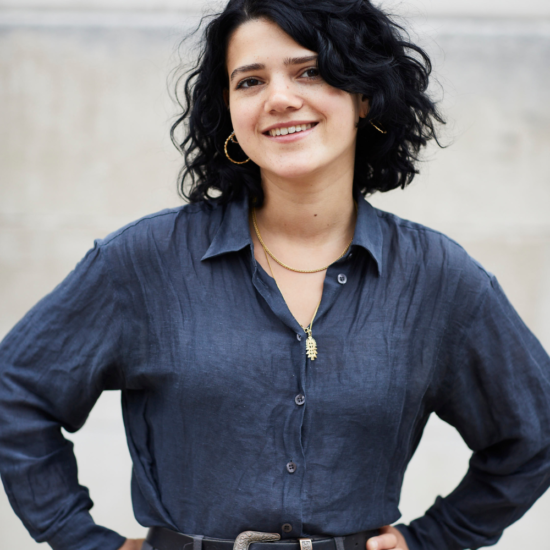How might we change the funder-practitioner power imbalance?
Place-based & systems change community
Our last place-based systems change community meeting was an online event on the theme of funder-practitioner power dynamics. Jenny Oppenheimer, Philanthropy Partnerships Lead at Lankelly Chase Foundation, helped orient a conversation about how to move towards more collaborative and equitable dynamics.
The subject of power dynamics feels taboo. Many of us are uncomfortable talking about the dynamics between those who have money (ie funders) and those who need money to do their work (ie practitioners). Those power dynamics can also mirror the inequities along the lines of class, race, gender, disability, sexual orientation, migration status etc.
But it’s not as clear cut as that. Not every funder comes from a background of status and privilege, and not every practitioner has lived experience of the injustices they’re trying to address through their work. Funder-practitioner categories aren’t binary either – many people in our community have been practitioners as well as funders or both at the same time.
Nonetheless the imbalance exists. In this meeting we decided to focus on the behaviours we’re witnessing, in ourselves and each other, that result in dynamics that don’t align with our values and visions for a kinder, more just and sustainable world.
We were joined by Jenny Oppenheimer, Philanthropy Partnerships Lead at Lankelly Chase Foundation, which has recently announced that it will redistribute all its assets and close within a five year timeframe.
Jenny helped orient our conversation by sharing some of the work she and her colleagues have done in trying to shift the traditional funder-grantee dynamic into something more collaborative and equitable. Jenny mentioned for example:
- Focusing on principles rather than outcomes
- Decentring yourself as the funder
- Devolving decision-making
- Taking a relational approach to grantmaking
- Building solidarity through networks
- Decolonising your funding practices
- Finding people who hold you accountable to your principles and practices
What behaviours could we unlearn?
Acknowledging the power dynamics within the room, we broke into three groups to discuss the behaviours we want to unlearn and the behaviours we want to adopt to shift funder-practitioner power dynamics.
Using Jenny’s insights as a starting point, here’s what the three groups told us they want to move away from:
| Place-based practitioners | National organisations | Funders |
| Giving funders the power to determine how, where and when work is delivered. Having to compete for funding in response to project specific tenders, rather than creating collaborations around issues that matter. Using language that places greater value on money than anything else i.e. ‘funder’ and ‘grantee’. Not placing enough value on lived experience. Only having funding for specific projects rather than organisational capacity. | A need to evidence outcomes rather than focusing on the meaningful, slow, work of creating the conditions necessary for change. A lack of adaptability and flexibility in funding for systemic work. Short term funding rounds that create learning gaps, development; staff; and progress challenges. Passing on grant funding to smaller local actors and reinforcing harmful behaviours and reporting pressures. | Organisations feeling that they need ‘permission’ to achieve a goal in a certain way. The idea of ‘value for money’. Not wanting to share decision-making with external stakeholders. Jargon and excluding language in funding applications. Funding based on personal relationships and biases. |
Many of the behaviours that place-based delivery organisations highlighted required a shift not only in their own behaviours but also in funders and right across the social sector. While the funder group recognised their role and shared a collective ambition to do things differently.
Interestingly, many challenges national organisations shared reflect the challenges we recognise from evaluating place based and systemic change.
What behaviours could we adopt?
The place-based delivery organisations want to move towards a shared understanding of sustainability (for whom? and for how long?); and how sustainability and lived experience could be resourced. While also interrogating how paying people for participation can reinforce power dynamics to ensure it is empowering.
They also want to move towards accessing funding as a place-based system, through collaboration and community engagement, rather than based on organisational specialisms.
While the national organisations group had a distinct energy reflecting the increased ‘bargaining power’ they feel relative to place-based organisations, there were similarities in the changes they want, such as around lived experience.
They also want to see more flexibility in commissioning models and to move away from competitiveness towards solidarity, shared learning and influencing. For example, where a funder has a set view on what evaluation should look like, how might organisations push back and influence a change in that view together?
The funders group discussed addressing power dynamics by thinking differently about how oppression works intersectionally and how it influences decisions, investing in transparent and collaborative decision making processes that are less prescriptive, and creating approachable environments where grantees can share how funding processes and priorities might need to change.
They aimed to change behaviours by being more flexible and proportional (e.g. around due diligence and how funding can be spent), clearer about what they can and can’t do, and owning their power and the responsibility that comes with it.
We ended the session by envisioning what a future where we all practised these behaviours could look like, encapsulated below in two word clouds.
What would a changed funder-practitioner dynamic feel like?

What would it enable you to do and be?

Exploring how power works across systems, its role in deep collaborative work, and its influence on what we value and accept as true is a critical part of our systems inquiry. If you’d like to be part of this work, or just learn more about how our journey in understanding what is takes to change a system please reach out to Kezia Jackson-Harman.
Attend the next place-based systems change community meeting
Our next community of practice meeting takes place on 25 October, 12.30-14:00.
The topic emerged from our discussions about the potential of co-design to rebalance funder-practitioner power dynamics. In the meeting, we will explore how co-design and co-production can support funding for place-based systems change.
Join us if you’d like to share ideas and learning about how these participatory approaches can shift power in places.

- Want to find out more?
- Contact Kezia Jackson-Harman on:
- 2045244916
- k.jackson-harman@renaisi.com




